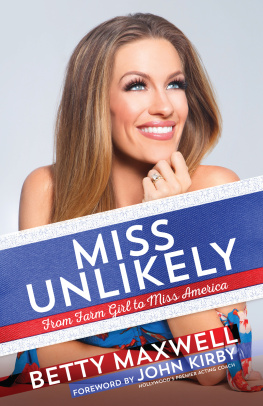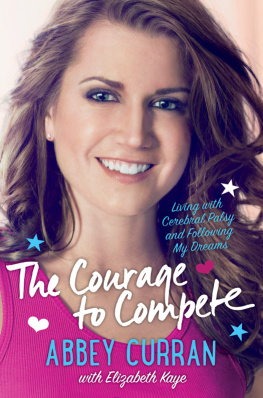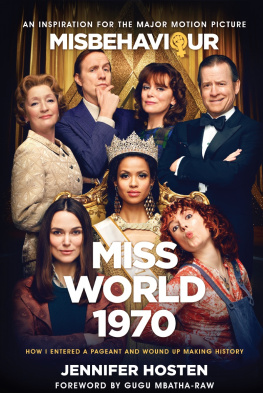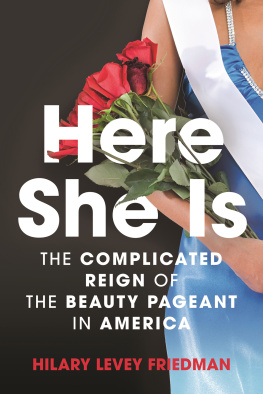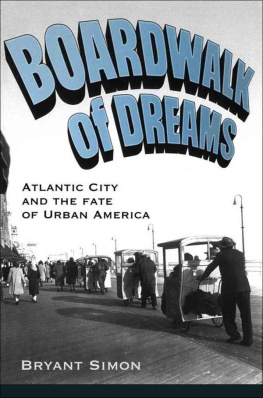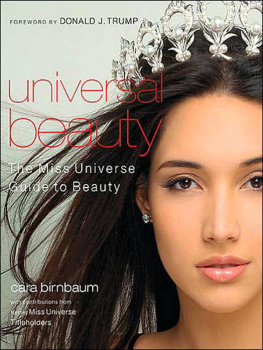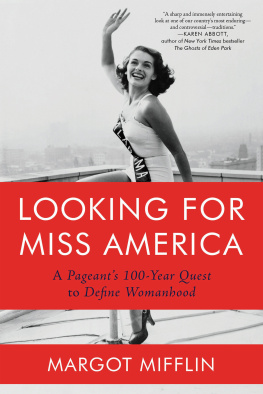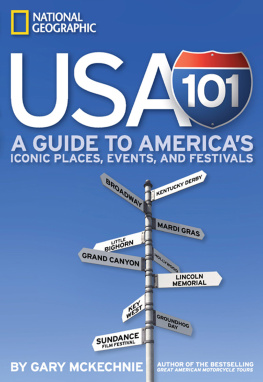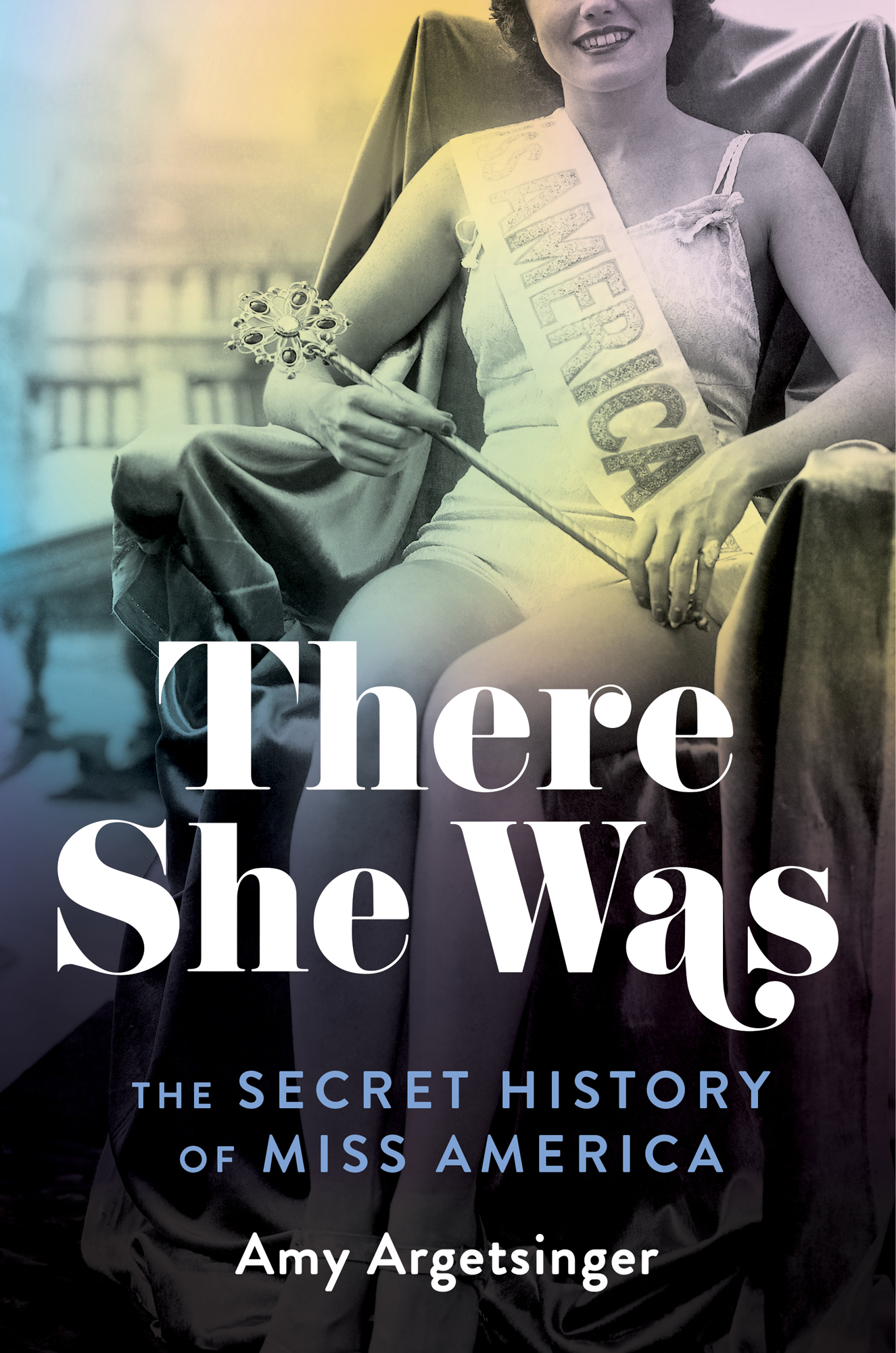Contents
Guide
There She Was
The Secret History of Miss America
Amy Argetsinger
To Jean Sause Argetsinger, who also had an amazing century. And who would be so delighted that I had written a book and that it was not about her.
And to Bill and Eliza, for absolutely everything.
AUTHORS NOTE
M iss America is an institution forever grappling with its own legend. Thats why this story interweaves narratives from its past and present rather than following a straight chronology. Meanwhile, some of the customs and vernacular of the pageant world embedded in this narrative may require a little explanation.
Before 1950, a Miss America received a title matching the calendar year of her crowning. After 1950, the title was postdated to reflect the upcoming year. So, Phyllis George, crowned in September 1970, was Miss America 1971. From 2006 to 2013, the pageant was held in January, and those winners received a title marking the new year.
The words pageant and contestant have been officially discouraged by the Miss America Organization since 2018, but they remain in common parlance and are frequently used in this bookalong with the occasional colloquial use of the word girls, echoing conversational style within pageant circles and by pageant women themselves.
For consistency, this book mostly uses the names women were known by when they competed. And all characters are referred to on second reference by their first names. The historic Atlantic City Convention Hall became Boardwalk Hall in 1997 after the city built a modern new convention center; this book sticks with its original name.
With my focus on Miss Americas most recent half century of existential struggle, I could not do justice to all the personalities and intrigue of its earlier decades. Readers will find them more fully evoked in Frank Defords groundbreaking 1971 history, There She Is: The Life and Times of Miss America.
PROLOGUE
T he Miss Americas started arriving at the house around noon on Friday, and most never left until Sunday. They had everything they needed in the rambling vacation rental in Kissimmee, Florida, for this January weekend in 2018food, wine, spa treatments, swimming, each other.
It was only the fourth time they had gotten together like this, but already the multigenerational gathering was starting to feel like a traditiona secret society of women bonded by an ineffable honor and a brief dance with fame. BeBe Shopp, the vibraphone-playing farmgirl crowned in 1948, was there, and so was Kira Kazantsev, the golf-prodigy daughter of Russian immigrants who was Miss America 2015. So was Nina Davuluri, from 2014, the first Indian-American Miss America, and Heather Whitestone, 95, the first hearing-impaired winner; Jacquelyn Mayer, 63, who charmed pageant fans in her day by trilling My Favorite Things, and Leanza Cornett, 93, who shocked them with her ahead-of-the-curve AIDS advocacy, among a dozen other former winners.
They always set aside some time for serious talkand this year, they needed it.
It was one of the groups younger members, Laura Kaeppeler, 12, who had started the tradition when she invited them all to the Malibu home she shared with her husband, reality-TV magnate Mike Fleiss. Now photos of their annual reunion filled scrapbooks and Facebook feeds: the time Ericka flirted with the handsome chef at Tawnys party in Santa Ynez; the time Maria analyzed everyones astrological sign; the year Elizabeth returned to the fold after three decades of distance. And the time Vonda reenacted her winning 1964 ventriloquist act, but with Leetheir beloved Lee Meriwether, 55, whose glorious 1970s TV career they were so proud ofplaying her dummy. Things get lively when you have that many Miss Americas in one place. And sometimes rather loud.
Its hard to win an argument in a room like that, Caressa Cameron, Miss America 2010, said later, when everyone is equally articulate and equally passionate.
Gretchen Carlson was attending for the first time that year. Even in a house full of semi-famous women, Miss America 1989 was something of a visiting celebrity. She had just come off the highest-profile period of her career, the decade-plus she had spent as a Fox News host until she accused the networks powerful cofounder, Roger Ailes, of sexual harassment; he stepped down after other women were emboldened to share their horror stories. Now Gretchen was an in-demand public speaker and magazine cover star considered a godmother of the roiling MeToo movement. Just weeks earlier, she had been named the new chair of the Miss America Organizationthe first former Miss America to hold the job.
Gretchen could not stay through the weekend. But she made a point of flying in for a couple hours: She had business to discuss with her Miss America sisters.
And so they all gathered in an airy upstairs den, snuggling into the sectional sofa and pillows on the floor. Gretchen had stepped into the job after a wildfire scandal took out the entire Miss America leadership just before Christmasa leak of emails showing the previous chair, a man, mocking, gossiping, and griping about former Miss Americas, even laughing (bahahaha) at a colleagues particularly vulgar slur.
The Miss Americas had banded together in protest; they had pushed for his resignation and Gretchens takeover. The crown had left its mark on them. Now they were eager to claim ownershipand redefine what this crazy, lofty, dusty title was supposed to mean in a changing world.
But their new leader had a blunt warning. Miss America was in financial peril, the organizations very survival was in question. At the heart of the problem, Gretchen said, was the swimsuit competition.
Pretty girls in bathing suits: That was what had put the pageant on the map from the time Atlantic City launched it as a Roaring Twenties tourist attraction. But Gretchen warned that everything had changed in the MeToo era. Would society still tolerate a show that asked young women to compete for scholarships in bikinis?
In fact, the pageants problems ran deeper than even Gretchen seemed to realize. Within months, the world of people who still cherished Miss America would be at war. Many of the women in this room, who had traveled so far to be together, would no longer be speaking.
But who in that moment could have imagined? Of course Miss America was in crisis: That was the story of its past fifty years, if not one hundred. And yet it had always endured. And now the Miss Americas themselves were ready to take charge. They uncapped their pens and started brainstorming.
Introduction SOMEWHERE OUT THERE IS WHAT YOU WANT TO DO
T he 1969 Miss America pageant kicked off on the evening of September 7, 1968, as if everything were normalfifty women aged eighteen to twenty-four swanning across the stage in tailored suits, jaunty hats, and white gloves, the television lights sparking their expressions of wide-eyed delight.
Tonight, each of our fifty girls feels as if she were living a character in one of the happiest and most exciting of all storybooks! intoned our glamorous hostess for the night, Bess Myerson, the Bronx-born Miss America 1945, in her Upper East Side accent. Veteran emcee Bert Parks emerged from a puff of stage smoke, in white tie and tails, to serenade them.
Somewhere out there is what you want to do! he crooned amid a swelling chorus of strings. Somewhere out there is a someday you!



